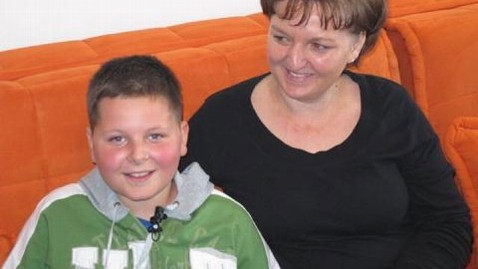Whatever Happened to the 6 Billionth Person?

(Radio Q Visiko)
ABC News’ Jean-Nicholas Vievet and Dragana Jovanovic report:
Meet Adnan Mevic. He got an unusual start in life. He was two days old when U.N. Secretary General Kofi Annan visited the Sarajevo hospital where he was born and cradled Adnan in his arms. It was 1999, and he was hailed as the 6 billionth person on planet earth. His photograph was published around the world.
It was a symbolic choice, of course. No one knew exactly who human being number 6 billion was, and after a decade of war in the Balkans, Sarajevo seemed like a good place to select a newborn to be an emblem for the hopes of mankind. His parents named him Adnan, after Kofi Annan. It was the closest Bosnian Muslim name they could find.
Now a seventh grader, he lives in a single-room apartment in the Bosnian city of Visoko with his parents. Times are tough for the Mevic family. Adnan’s father Jasmin is terminally ill with colon cancer and cannot work. His mother lost her job as a textile worker three years ago. Adnan has been diagnosed with a small hole in his heart. They survive on $350 a month and cannot afford the healthcare they need.
“We never heard from the U.N. again. We never received anything from them, not even a birthday card,” his mother Fatima tells ABC News.
The U.N. has chosen Oct. 31, 2011, as the symbolic date to mark the moment when the world’s population is projected to reach 7 billion. In reality, we may already be living with Baby 7 Billion, or perhaps he or she will be born next year. Experts disagree, and who can blame them? It’s hard to say, when about half a million babies are born every day.
This time the U.N. has decided not to select a baby. When asked by ABC News, a spokesperson for Secretary-General Ban Ki-moon didn’t really explain why.
“We do not really know the exact country and time of that birth,” the spokesperson said. “The UN Population Fund has however invited all countries to pick a symbolic baby 7 billion on 31 October.”
The human race has thrived lately. After growing slowly during most of our history (it took until the year 1800 to reach the 1 billion mark), the world’s population has more than doubled in the last 50 years. Net growth is now 78 million people every year, about the same size as the population of Germany.
That growth rate is slowing, but some demographers say there could be as many as 10 billion people sharing the planet by the end of this century. Most of the new arrivals will be in developing countries, in urban areas, with many in Africa and the Indian subcontinent.
Should we be worried, or be celebrating?
Malthusian arguments, that the planet cannot sustain more people, have made a comeback recently. Others, however, take a more relaxed view, pointing out that fertility is falling, and growth is slowing down, so we’ll see a flat population level by 2100, just like we did in the 18th century.
Either way, it’s impossible to deny the implications for everybody of soaring population growth. It will have an impact on economic development, competition for natural resources, biodiversity, energy consumption, global warming, urbanization and migration.
Monday’s 7 billion milestone “is a challenge, an opportunity and a call to action,” says the U.N. “Our record population size can be viewed in many ways as a success for humanity because it means that people are living longer and more of our children are surviving worldwide. But not everyone has benefited from this achievement or the higher quality of life that this implies.”
The organization says that “instead of asking questions like, ‘Are we too many?’ we should instead be asking, ‘What can I do to make our world better?’”
For 12 year-old Adnan Mevic, that means help for this father.
“What I would love most,” he tells ABC News, “is for my dad to be cured or get treatment.”